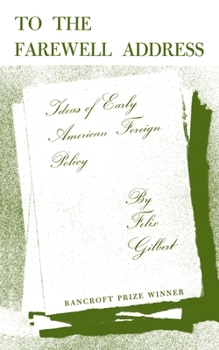To the Farewell Address: Ideas of Early American Foreign Policy
Select Format
Select Condition 
Book Overview
Washington's Farewell Address comprises various aspects of American political thinking. It reaches beyond any period limited in time and reveals the basic issue of the American attitude toward foreign policy: the tension between Idealism and Realism. Settled by men who looked for gain and by men who sought freedom, born into independence in a century of enlightened thinking and of power politics, America has wavered in her foreign policy between...
Format:Paperback
Language:English
ISBN:0691005745
ISBN13:9780691005744
Release Date:July 1970
Publisher:Princeton University Press
Length:181 Pages
Weight:0.53 lbs.
Dimensions:0.5" x 5.5" x 8.4"
Customer Reviews
2 ratings
Isolationism Reconsidered
Published by Thriftbooks.com User , 21 years ago
With the removal of Saddam Hussein and the Taliban from power and American troops spread across the globe engaged in a war on terrorism, empire has become a hot topic in WashingtonNotwithstanding our current overseas commitments, a strong strain of isolationism has been characteristic of American foreign policy since the formative days of our country. Washington's warning against "permanent alliances" in his Farewell Address of 1796 was cited by successive generations of politicians to justify an isolationist foreign policy.While Washington's warning is often discussed, the internecine political rivalries surrounding Washington's address are not.Felix Gilbert examines the background to the address quite capably in To the Farewell Address: Ideas of Early American Foreign Policy. He first examines the geopolitical context of the late eighteenth century, particularly the U.S. relationship to Europe's power structure. He argues that early American distaste for the diplomatic status quo and desire for separation from the Continent's power politics can be directly linked to the concepts of British political theorists. America's early leaders brought these ideas to the New World, giving them a uniquely American flavor.Gilbert's eventual focus is on the political climate during the end of Washington's tenure as President. The administration was beset by infighting, with federalists and republicans staking out different positions on issues, including foreign policy. Washington, seeking to bring both sides together, asked Alexander Hamilton to revise an address that had been prepared at the end of his first term, which was authored by Hamilton's rival, James Madison.Hamilton, eager to rework Madison's views, exchanged several drafts with Washington, and the final product bears his imprint, particularly on foreign policy matters. Through an analysis of this correspondence, Gilbert is able to trace these views regarding limited American engagement in the world from the theorists to their eventual place in the address.To the Farewell Address is a short, succinct account of the progress of an idea that has had great impact on American foreign policy. It is an important read for anyone interested in understanding the roots of U.S. foreign policy. As some declare Washington to be the new Rome, it is important to remember from whence we come. But as Gilbert notes in the final paragraph, the standard view of the Farewell Address as a purely isolationist warning is flawed:"Because the Farewell Address comprises various aspects of American political thinking, it reaches beyond any period limited in time and reveals the basic issue of the American attitude toward foreign policy: the tension between Idealism and Realism. Settled by men who looked for gain and by men who sought freedom, born into independence in a century of enlightened thinking and of power politics, America has wavered in her foreign policy between Idealism and Realism, and her great histor
A quick and educational read
Published by Thriftbooks.com User , 23 years ago
I read Felix Gilbert's _To the Farewell Address_ in an undergraduate course on US foreign relations. This is a book that exemplifies how a short, concise, yet informative history can be written.Gilbert discusses how ideas about foreign policy in the eighteenth century related to actual US diplomacy. Although the Latin headings of some chapters may be intimidating, the prose is not. The book flows and does not lose momentum in exhaustive analysis or a burdensome number of pages. At 169 pages, this book can be finished in a weekend. Gilbert focuses on the period from 1776 to 1796, culminating with Washington's Farewell Address. In doing so, Gilbert provides depth and insight to this formative period of US diplomacy. The roots, context, and controversies of US diplomacy from 1776 to 1796 are described and explained in the book. Much of Gilbert's analysis is still relevant to this day. In general, the book is a scholarly, yet short and enjoyable read.






